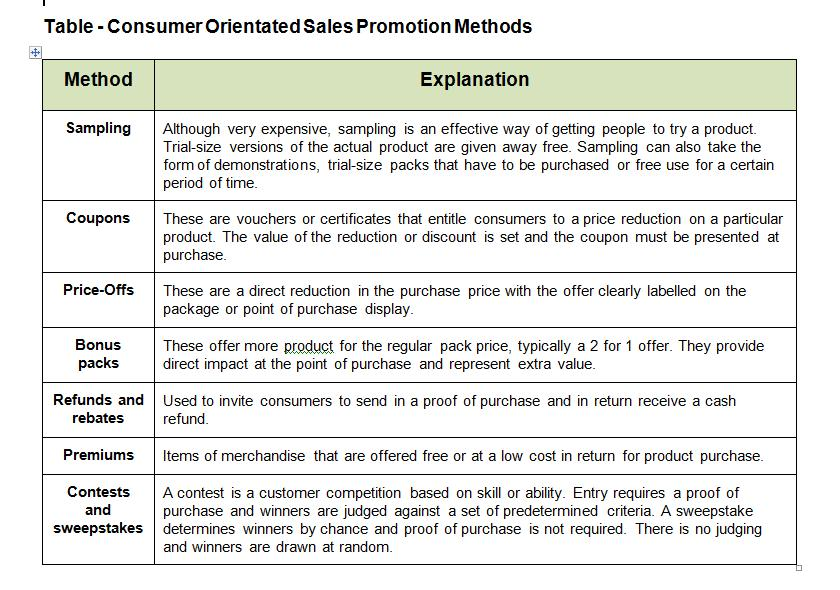Consumer Promotion Tools
The major consumer promotion tools include price packs, coupons, and samples cash refunds, premiums, advertising specialties, point-of-purchase, patronage rewards displays and demonstrations, and sweepstakes, contests and games.
- Samples are offers of a trial amount of a product. Sampling is the most effective but most costly way to introduce a new product. Some samples are free; for others, the company charges a little amount to offset its cost. The sample may be delivered door-to- door, handed out in a store, sent by mail, attach to another product, or featured in an ad. On occasion, samples are combined into sample packs that can be used to promote other services and products.

- Coupons are certificates that provide buyers a saving when they buy specified products. Most of the consumers love coupons: Coupons may stimulate sales of a mature brand or promote early on trial of a new brand. But, as a result of coupon clutter, redemption rates have been failing in recent years. Therefore, most major consumer goods companies are issuing fewer coupons and focusing them more carefully.
- Cash refund offers (or rebates) are such as coupons except that the price reduction tale place after the purchase instead of at the retail outlet. The consumer sends a "proof of purchase" to the producer, who then refunds part of the buy price by mail.
- Price packs (also known as cents-off deals) offer consumers savings off the usual price of a product. The reduced prices are directly marked by the manufacture on the label or package. Price packs may be single packages sold at a reduced price (like two for the price of one), or two associated products banded together (like a toothpaste and toothbrush). Price packs are so effective even more than coupons in stimulating short-term sales.
- Premiums are goods offered either free of charge or at low cost like an incentive to purchase a product, ranging from toys included with kids' products to phone , compact disks, cards and computer CD-ROMs. A premium can come inside the package (in-pack), outside the package (on-pack), or by the mail.
- Advertising specialties are helpful articles imprinted with an advertiser's name provided as gifts to consumers. Typical items include calendars, pens, key rings, shopping bags, nail files, T-shirts, matches, caps, tops, key chains and coffee mugs. Such items may be very effective. In a current study, 63 % of all consumers surveyed were either wearing or carrying an ad specialty item. More than three-quarters of those who contain an item could recall the advertiser's name or message before indicating the item to the interviewer.
- Patronage rewards are cash or other awards offered for the frequent use of a certain company's services or products. For instance, airlines offer regular flier plans, awarding points for miles travelled that may be turned in for free airline trips.
- Point-of-purchase (POP) promotions include demonstrations and displays that take place at the point of sale and purchase. Unluckily, many retailers do not like to handle the hundreds of signs, displays and posters they obtain from manufacturers each year. Manufacturers have responded by offering enhanced POP materials, tying them in with print messages or television, and offering to set them up.
- Sweepstakes, Contests and games give consumers the possibility to win something, like trips, cash or goods, by luck or through extra effort. A contest calls for consumers to submit an entry-a jingle, suggestion, guess -to be judged by a panel that will choose the best entries. A sweepstakes calls for consumers to submit their names for a drawing. A game presents consumers with something such as bingo numbers, missing letters every time they purchase, which may or may not help them win a prize. A sales contest urge dealers or the sales force to boost their efforts, with prizes going to the top performers.